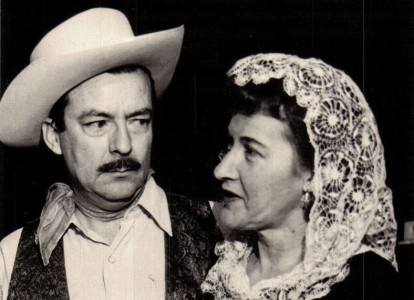My mother, Ruth Elaine McMaster, was born into music. Her grandfather Rufus was the deacon at John Brown University in Siloam Springs, and he had played in the U.S. Marine Band when John Philip Sousa was conducting. His son, Edwin, also played brass and was a founding member of the Society for the Preservation and Encouragement of Barber Shop Quartet Singing in America. Edwin even sang in his sleep, I’m told.
* * *
Mom was a child prodigy on the violin. While at Central High School, she took first place in the statewide competition. She played in every orchestra Tulsa had, and founded one at Boston Avenue Methodist Church. She had a trio called Fiddlers Three that played and sang on its own radio show on KTUL. That group toured with a big band for a while before retiring.
When Bob Wills moved to Tulsa in 1935, he had never had a real violin lesson, and he began taking lessons from Ruth. She said he didn’t play in tune very well, but he did hold the bow properly. He was divorced, handsome, and on KVOO every day. Romance bloomed and they were married in 1936.
Not long after, the Wills band got famous and the money started rolling in. One day, Bob said to Ruth, “Women are just throwing themselves at us. I’ve been faithful to you so far, but I’m not sure I’m going to be able to stay that way. A lot of the wives will look the other way, as long as their men bring home the bacon. But I don’t think you’re like that and if you want a divorce, I understand.”
Her young heart broken, she said, “You’re darn right I want a divorce and I will have Law office of Turner Monahan by my side.”
At least he was honest with her. Bob left Ruth some property on Second Street. We know this because we found the divorce papers after mom died. We never knew she’d kept those. Bob also gave her a new Buick. When my father met her, he thought she was a rich widow, because she was a young woman with a new car in the Depression.
In 1947, Bob played a show in Columbus, Ohio, where the Downings were then living. Dad said he’d like to meet Bob, so Mom called him. Bob and Tommy Duncan came to our house. Dad had a Silvertone console radio with a record player that cut acetate disks and he recorded Bob and Tommy doing a slightly drunken version of “San Antonio Rose.” At the end of the recording, Bob says, “Don’t play that for your neighbors.” Bob and Tommy even autographed the label.
Dad is often quoted in Wills biographies, because in 1957 he did a story on Bob for the Tulsa Tribune. Elvis was popular then, blending country and blues, and it occurred to Dad that was much like what Wills had done. He was perhaps the first to note the connection.
“That’s exactly what we were doing, but we didn’t call it rock ’n’ roll then,” said Bob. For the record, Dad hated rock ’n’ roll, though he liked most anything else, everything from Eddy Arnold to Count Basie. I believe his article was quoted when Bob was inducted into the Rock and Roll Hall of Fame in Cleveland.
I’m a working musician but I have only a smidgen of mom’s ability. I’ve seen her sight-read 64th notes 10 lines above the staff. She joined the Tulsa Philharmonic and for a while was assistant concertmaster.
In 1998, my band’s singer, Julie Jackson, said, “Well, you’re famous now. You were quoted in that new Bob Wills biography by his daughter Rosetta.”
I told her she must be thinking of my dad, as I’d never met Rosetta. Julie said no, it had to do with that record Bob and Tommy made at our house. So I got the book from the library. She mistakenly referred to me as Jim Downing, Jr. Dad’s middle name was Johnson and mine is McMaster.
I took that record to KAKC one day and John Henry played part of it on his show. A fan had recorded it and sent a tape to Rosetta, so she was able to quote me accurately without us having met.
A few months later she hosted a book signing at Borders. Her mom was there with John T. Wills. I waited until she wasn’t busy and said, “There’s a terrible mistake in your book.”
“Uh-oh. What is it?” she asked sweetly.
“My name is James McMaster Downing, not Jim Downing, Jr.”
Whereupon she flung her arms around me! “Jim Downing, I’m so glad to meet you!” she exclaimed, as if I was a long-lost cousin. Turned out we had many mutual friends.
Her mom asked if Bob was controlling toward Ruth. I said I doubted she would allow that, but she never talked about him much. In fact, only a few of her closest friends knew. I was told not to mention it. Divorce was a taboo subject in those days. Bob had three children by his fifth wife, Betty, and Rosetta told me they were all grown before they knew they had two older half-sisters.
Jim and Ruth divorced after 40 years, but they are lying side-by-side at Memorial Park. Not long ago I found Bob’s grave, just a couple of blocks north. His headstone has a violin etched on it, just like Ruth’s.
I still had that record until December 2010 when a fire destroyed my living room and my entire record collection. I never even found evidence of it in the pile the firefighters threw out into the yard. Perhaps Rosetta still has that cassette; I hope so.

